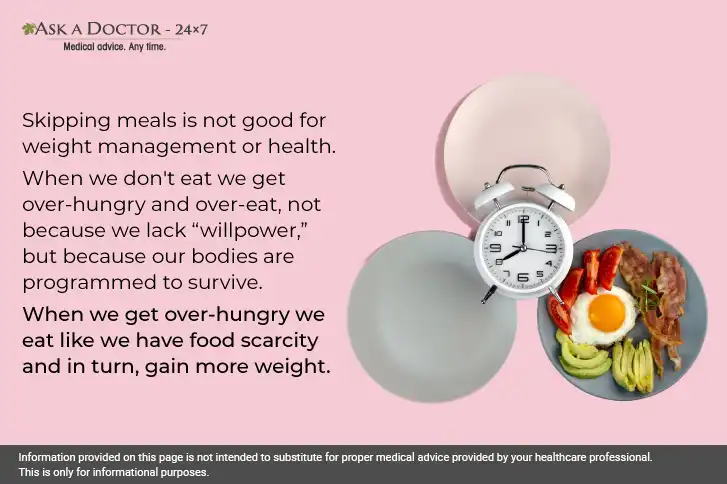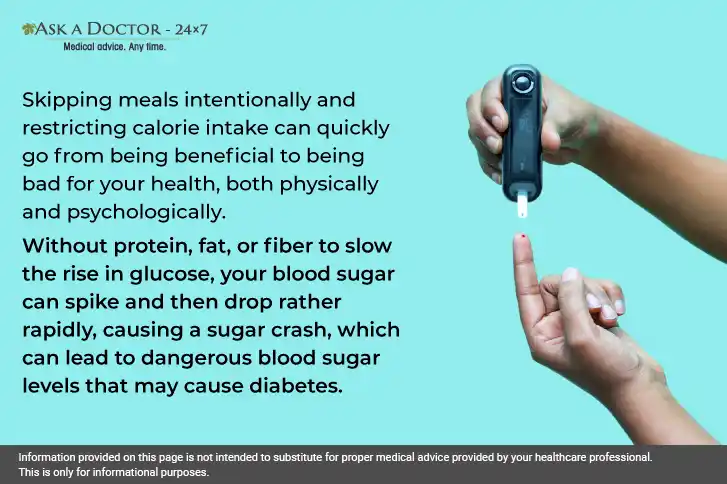Does Skipping Meals Help To Lose Weight? Find The Facts!
Skipping a meal means lesser calorie intake. Since losing weight is all about creating a calorie deficit in the body, skipping meals restricts calorie intake and forces the body to use stored energy reserves. While on a weight loss regime, this will bring about quick weight loss. Sounds easy, doesn't it? But, does it really work this way? Or is it just another myth concerning weight loss?
This blog reveals the realities related to skipping meals and a few more health facts. Read on…
Let's Find Out Why it is a MYTH!

If you are trying to lose weight, skipping your meals may have the opposite effect. Several researches have shown that people who skip their meals are more likely to be heavier on weight than those who don’t. Surprised? Yes, that’s exactly what missing a meal can do to your body! Let’s look at how it works.
Skipping a meal means going without food for long periods. When you skip a meal, your body is deprived of essential nutrients and the calories or energy to keep it running. It may lead to a feeling of extreme hunger. As a result, your body begins to crave energy-loaded foods such as those rich in fat and sugar.
Research has shown that people who skip their meals usually load up their plates with sugary, starchy, energy-dense foods during their subsequent meals. Thus, skipping a meal makes you overeat later and also opt for junk food instead of going for healthier alternatives. Eventually, it may lead to greater weight gain around the belly.
Going hungry too often puts your body into a state of starvation that may slow down your metabolism. Metabolism or to be more specific, BMR (basal metabolic rate), is the rate at which your body burns calories. When your metabolism slows down, it means you are burning calories at a lower rate than earlier. As a result, you may end up losing very little weight or no weight at all!
What Happens to Your Health When You Skip Your Meals?

Without protein, fat, or fiber to slow the rise in glucose, your blood sugar can spike and then drop rather rapidly, causing a sugar crash, which can lead to dangerous blood sugar levels that may cause diabetes.
When you don’t eat enough or start skipping your meals, you will experience:
1. Drop in blood sugar or glucose, the main sugar found in your blood.
A drop in your blood sugar can make you feel tired, giddy, and sluggish, and you may also face difficulty in concentrating because your brain doesn’t get the adequate amount of food that it needs to think straight.
2. Slow down in resting metabolism
When you do not eat enough or skip meals your body goes into starvation mode, or a fasted state and in this condition, your brain signals your body to slow down its functions to conserve energy and burn fewer calories. This in turn results in weight loss for a shorter duration but over time you will regain body weight as you start eating normally again.
3. Hormonal imbalance
When you skip meals, the function of several hormones including insulin, leptin, cortisol, and ghrelin gets disrupted. This happens because our body has built-in hunger and fullness signals in the form of hormones, which let us know when to eat and when to stop eating. By ignoring hunger cues we tend to create hormonal imbalance.
4. Crave for unhealthy food and overeat
When you do not eat for an extended period you tend to have cravings – specifically for unhealthy carbs and sugar. To satiate your body’s prolonged hunger with instant energy you pick up carbs or sweets over healthy, nutrient-dense foods. Although it provides instant glucose to the body, making you feel better instantly, in the long run, you tend to lose control over eating your next meal or snack, which leads to binge eating. This way your efforts to lose weight by skipping meals get completely shattered in the long run.
5. Miss the joy of eating good food
Skipping meals and restricting calories intentionally can be bad for your health, both physically and psychologically. Although you will not realize it in the beginning, gradually this habit may lead to many eating disorders, such as orthorexia (unhealthy focus on healthy food), anorexia, and bulimia. Further in the long run you may develop a very harmful relationship with food and may miss the joy of eating good food.
Conclusion
We all skip meals from time to time due to extremely busy days but doing it intently, over and over again, can badly hurt our health. If you think skipping meals does cause weight loss, it might be you could have lost a few pounds but it surely does not help lose the body fat! Moreover, the lost weight comes back two-fold when you start eating your normal diet again. Hence, to lose weight, eat judiciously a balanced diet inclusive of fruits, vegetables, whole grains, nuts, seeds, legumes, lean proteins, and healthy fats, and make sure to work out religiously – but never skip your meals.
You can Ask a Dietitian about an eating plan designed exclusively for you, be it for weight loss or any disease management meal plan – at Ask A Doctor - 24x7. Along with dieticians, there are more than 18000 certified doctors available 24x7 to help you with your medical queries. Ask your health questions and get answers from the expert specialists in minutes.
Recently Answered Queries Related to Weight Loss
- Is Skipping A Meal Recommended While Dieting?
- Can I Take an Insulin Shot Even After Skipping Meals?
- What Causes Weakness, Lack Of Energy, And Anxiety While Skipping A Meal?
- What Causes Stomach Pain And Tight, Bloated Feeling Despite Skipping Meals?
- What Causes Headache After Skipping Meal?
- I Am Having a Headache Due To Irregular Food, What Should I Do?
- Headaches, Vomiting Sensation After Skipping Meal. Solution?
- Dizziness, Lightheadedness, Skipping Meals. What To Do?
- Is Skipping Meal While Breastfeeding Safe?
Disclaimer: Information provided on this page is not intended to substitute for proper medical advice provided by your healthcare professional. This is only for informational purposes.
Ask a Specialist
Recent Questions


